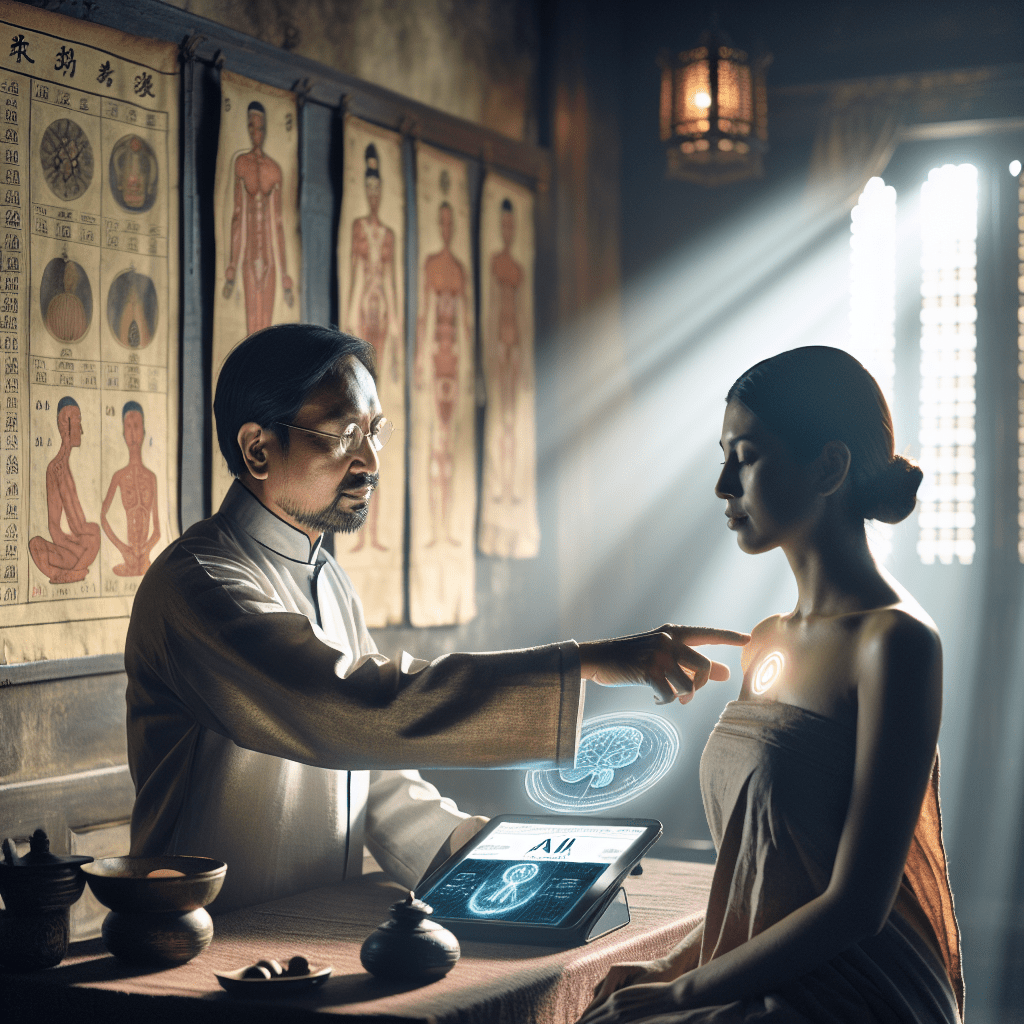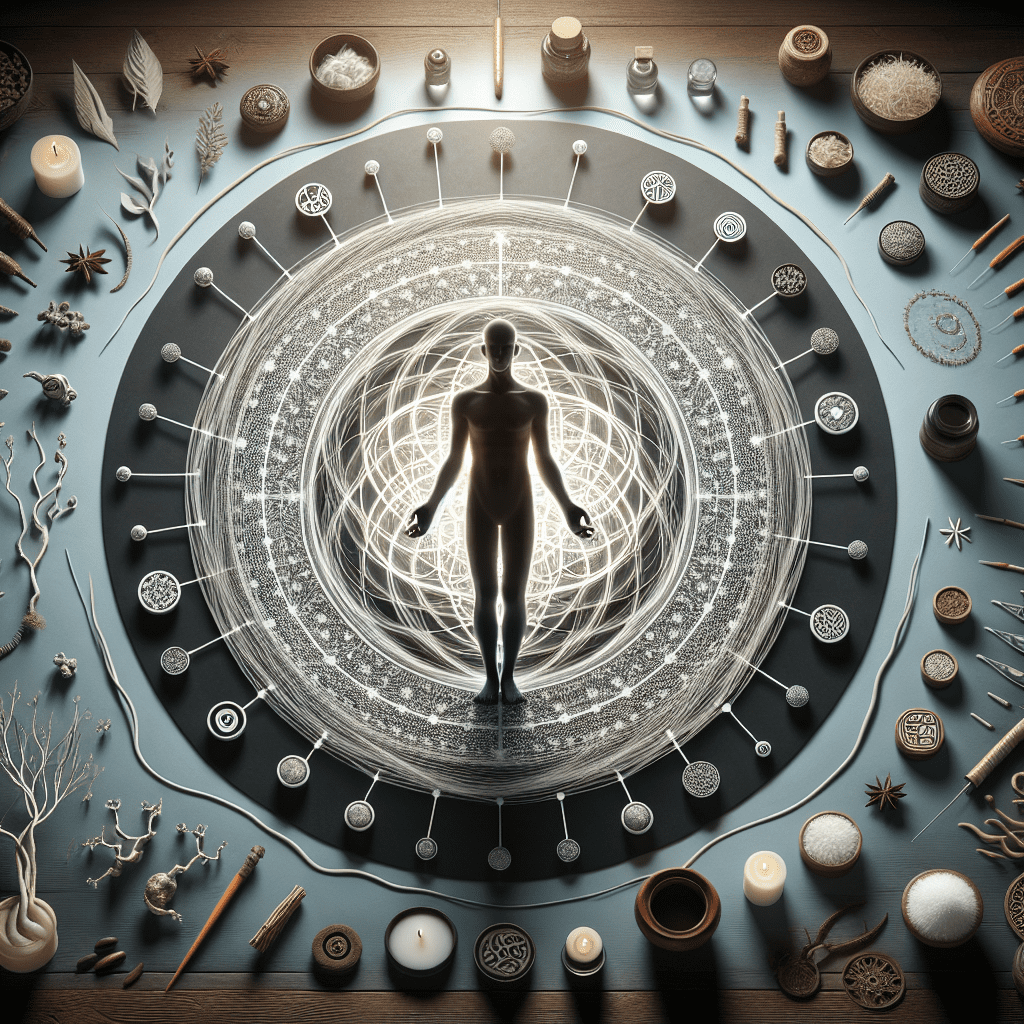In the evolving landscape of healthcare, a fascinating convergence is taking place—where ancient Eastern medical traditions meet cutting-edge artificial intelligence. This intersection of Eastern medicine AI is capturing the attention of health enthusiasts worldwide who are seeking more holistic approaches to wellness. The marriage of 2,000-year-old wisdom with modern technology promises a revolutionary approach to healthcare that may surpass conventional diagnostic methods.
The Holistic Approach of Eastern Medicine
At the heart of Traditional Chinese Medicine (TCM) lies syndrome differentiation—a diagnostic approach fundamentally different from Western medicine. Rather than focusing solely on isolated symptoms, Eastern medicine examines the entire person, considering physical symptoms alongside emotional states, environmental factors, and constitutional tendencies.
This holistic approach views the body as an interconnected system where imbalances in one area can manifest as symptoms elsewhere. For instance, TCM practitioners might identify patterns of disharmony by examining the tongue’s appearance, feeling pulse qualities at different positions, and noting emotional states—all contributing to a comprehensive health picture that considers the whole person rather than just the disease.
Traditional syndrome differentiation requires years of training and experience to master. Practitioners must integrate complex relationships between symptoms, environmental factors, and constitutional types. This process, while powerful, relies heavily on the individual practitioner’s expertise and interpretation—creating natural variations in diagnosis and treatment recommendations.
AI Enhancement of Syndrome Differentiation
Artificial intelligence is revolutionizing syndrome differentiation by processing vast amounts of clinical data and identifying subtle patterns that human practitioners might miss.
Eastern medicine AI systems are transforming this ancient practice by analyzing vast datasets of patient information, symptom patterns, and treatment outcomes. Unlike human practitioners who can only draw from their personal experience, AI systems can process information from thousands of cases simultaneously, identifying subtle patterns that might otherwise go unnoticed.
Machine learning algorithms excel at recognizing these complex correlations between seemingly unrelated symptoms. For example, an AI system might identify that a specific tongue coating combined with particular pulse qualities and sleep patterns indicates a deeper imbalance that even experienced practitioners might occasionally overlook.
“The integration of AI with TCM represents a transformative intersection of advanced technology and ancient medical practices,” notes a recent study published in the Journal of Integrative Medicine. This integration doesn’t replace the human practitioner but rather augments their abilities by providing data-backed insights to support clinical decision-making.
Eastern medicine AI platforms can now analyze digital images of tongues, record and analyze pulse patterns through sensors, and process questionnaire responses to form comprehensive diagnostic profiles with remarkable accuracy. These systems continue to learn and improve over time as they process more patient data.
Deep Learning Models in TCM Diagnosis
Deep learning, a sophisticated form of AI, has shown particular promise in TCM diagnostics. These models excel at classifying multiple syndromes simultaneously—a task that aligns perfectly with Eastern medicine’s approach to complex conditions.
Recent research shows that deep learning models can achieve accuracy rates exceeding 85% in identifying common TCM syndrome patterns by analyzing clinical data. These models work by recognizing complex relationships between hundreds of variables, including subjective symptoms, objective signs, and constitutional factors.
The predictive capabilities of these models allow practitioners to anticipate how conditions might develop over time. For example, an AI system might identify early indicators of a pattern disharmony before it manifests as more serious symptoms, enabling earlier intervention with gentler treatments.
One fascinating application involves the analysis of tongue images—a cornerstone of TCM diagnosis. AI systems can now detect subtle variations in tongue color, coating, and shape with remarkable precision, standardizing what was once a highly subjective assessment. Machine learning algorithms can detect minute changes invisible to the human eye, enhancing diagnostic consistency.
Systematic Mapping of Symptoms to Syndromes
The systematic mapping capabilities of AI bring unprecedented structure to the complex art of syndrome differentiation, making Eastern medical wisdom more accessible and consistent.
Eastern medicine AI excels at creating systematic frameworks for syndrome differentiation. Traditional approaches rely heavily on the practitioner’s subjective interpretation, but AI systems bring structure and consistency to this process.
These systems methodically map symptoms to syndrome patterns using sophisticated algorithms. For example, when analyzing a patient with digestive issues, the AI might simultaneously consider energy levels, emotional states, sleep quality, and tongue characteristics to differentiate between syndromes that might present similar symptoms but require different treatments.
This systematic approach proves particularly valuable in complex cases where multiple patterns overlap. While human practitioners might gravitate toward familiar diagnoses based on their training or experience, AI systems evaluate all possibilities without bias, sometimes identifying overlooked syndrome patterns that better explain the patient’s condition.
A 2023 study published in the Journal of Integrative Medicine demonstrated how an Eastern medicine AI system successfully mapped symptoms to accurate syndrome differentiation in over 90% of complex cases involving multiple pattern overlaps—a significant improvement over traditional methods alone.
Improved Diagnostic Reliability
Perhaps the most compelling advantage of Eastern medicine AI is its contribution to diagnostic reliability. Traditional syndrome differentiation, while powerful, naturally contains elements of subjectivity and varies between practitioners. AI systems introduce consistency and data-backed verification to this process.
By analyzing thousands of successfully treated cases, these systems can identify which syndrome patterns most reliably respond to specific treatments. This data-driven approach reduces diagnostic uncertainty and helps standardize treatment approaches while still honoring individual differences.
The reduction in human error is significant. Factors like practitioner fatigue, cognitive biases, or limited experience with rare conditions can impact traditional diagnosis. AI systems maintain consistent performance regardless of these factors, providing reliable analysis even in challenging cases.
One healthcare center implementing Eastern medicine AI reported a 40% reduction in diagnostic variations between practitioners after integrating AI support tools. This improvement in consistency leads to more predictable treatment outcomes and better patient care.
The Future of AI and Eastern Medicine
As Eastern medicine AI continues to evolve, we can expect remarkable advancements in personalized healthcare delivery, preventative medicine, and accessible wellness solutions.
The collaboration between Eastern medicine AI and traditional practices is just beginning to reveal its potential. As these systems continue to evolve, we can anticipate several transformative developments in healthcare delivery.
Personalized medicine stands to benefit tremendously from this integration. By analyzing individual constitutional factors, environmental influences, and symptom patterns with unprecedented precision, Eastern medicine AI can generate highly customized treatment plans that adapt over time based on patient responses.
Remote healthcare delivery will likely expand through AI-powered diagnostic tools that can perform initial syndrome differentiation assessments before in-person consultations. This approach could extend the reach of Eastern medicine practitioners to underserved areas and make ongoing care more accessible.
Preventative health strategies may see significant advancement as these systems identify subtle imbalances before they manifest as clinical symptoms. The Eastern medicine philosophy of maintaining balance rather than simply treating disease aligns perfectly with AI’s predictive capabilities.
Research in Eastern medicine will likely accelerate as AI systems help identify and validate pattern correlations that were previously difficult to study due to the complexity of syndrome differentiation. This research could lead to broader acceptance of Eastern medical approaches in conventional healthcare settings.
Challenges and Considerations
Despite its promise, the integration of Eastern medicine AI faces important challenges that require thoughtful consideration. Data privacy concerns are paramount, as these systems require access to sensitive health information to function effectively. Rigorous security protocols and transparent data policies must be implemented to maintain patient trust.
The quality of training datasets represents another critical challenge. AI systems can only learn from the data they’re provided, so ensuring diverse, accurate, and comprehensive clinical information is essential. Systems trained on limited or biased datasets could perpetuate or even amplify existing gaps in healthcare delivery.
Perhaps most important is maintaining the human element in healthcare. Eastern medicine has always emphasized the practitioner-patient relationship as central to healing. While AI can enhance diagnosis and treatment planning, it cannot replace the empathy, intuition, and personalized attention that skilled practitioners provide.
“Even the most sophisticated AI cannot replace the human connection in healing,” notes Dr. Lin Wei, a TCM researcher working on AI integration projects. “Technology should enhance the practitioner’s abilities, not substitute for their presence.”
EASTCHI AI: Embodying the Integration Philosophy
EASTCHI AI stands at the forefront of this technological revolution, blending ancient wisdom with modern innovation to deliver personalized health insights.
EASTCHI AI exemplifies the successful integration of Eastern medicine wisdom with artificial intelligence. This innovative system embraces the 2,000-year-old principles of Eastern medicine while leveraging modern technology to deliver personalized health guidance.
By analyzing individual constitutional types through Five Element Theory, EASTCHI AI provides tailored nutritional recommendations and lifestyle suggestions that align with Eastern medicine’s philosophy of food as medicine. The system considers seasonal influences, constitutional tendencies, and current imbalances to generate comprehensive health support.
What makes EASTCHI AI particularly valuable is its ability to make Eastern medical wisdom more accessible and actionable for those seeking natural approaches to wellness. The system translates complex syndrome differentiation into practical recommendations that users can implement in their daily lives.
For health-conscious individuals interested in holistic approaches, EASTCHI AI offers a bridge between ancient wisdom and modern living—providing insights that might otherwise require years of study or regular consultations with Eastern medicine practitioners.
Conclusion
The integration of Eastern medicine AI represents a significant advancement in our approach to health and wellness. By combining the holistic wisdom of traditional practices with the analytical power of artificial intelligence, we’re witnessing the emergence of diagnostic capabilities that can indeed surpass conventional methods in many respects. By combining the holistic wisdom of traditional practices with the analytical power of artificial intelligence, we’re witnessing the emergence of diagnostic capabilities that can indeed surpass conventional methods in many respects.
This collaboration honors the foundational principles of Eastern medicine while enhancing its precision and accessibility. The systematic approach to syndrome differentiation, improved diagnostic reliability, and personalized treatment recommendations all contribute to a more effective healthcare experience.
As these technologies continue to evolve, they promise to make the profound insights of Eastern medicine more accessible to those seeking natural, holistic approaches to wellness. The future of healthcare may well lie in this thoughtful integration of ancient wisdom and cutting-edge technology—a combination that respects our traditional understanding of health while embracing innovation to better serve individual needs.
Eastern medicine AI doesn’t replace human practitioners but rather empowers them with unprecedented tools to better serve their patients. In this harmonious integration, we find a promising path forward for healthcare that honors both the wisdom of the past and the possibilities of the future.




